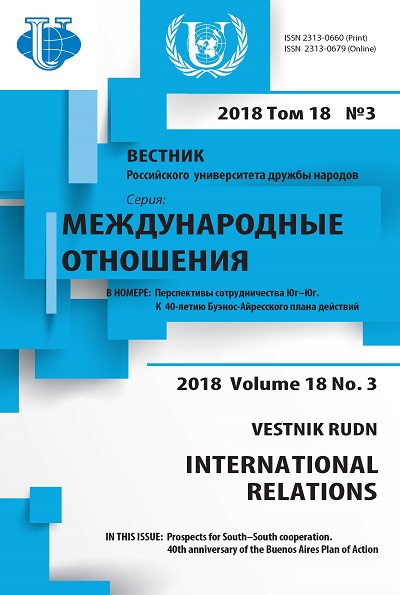ON THE EVE OF BAPA+40 - SOUTH-SOUTH COOPERATION IN TODAY’S GEOPOLITICAL CONTEXT
- Authors: Gosovic B.
- Issue: Vol 18, No 3 (2018): Prospects for South—South Cooperation. 40th Anniversary of the Buenos Aires Plan of Action
- Pages: 459-478
- Section: THEMATIC DOSSIER
- URL: https://journals.rudn.ru/international-relations/article/view/20098
- DOI: https://doi.org/10.22363/2313-0660-2018-18-3-459-478
- ID: 20098
Cite item
Full Text
Abstract
The “South-South cooperation” concept is still not widely known or used, except in the framework of the United Nations. Yet, its inception goes back more than 60 years, when the idea was crystallized as a key building bloc of the national liberation and anti-colonial struggle of developing countries1. The struggle found its apogee in the UN and was marked by the Congo crisis that witnessed the deaths of Patrice Lumumba and Dag Hammarskjold. In March 2019, the United Nations will hold the 2nd High-level Conference on South-South cooperation, in Buenos Aires, Argentina, to discuss the state and prospects of South-South cooperation (SSC) and chart a path for the future. The Conference will also mark the 40th anniversary of the 1978 UN Conference on Technical Co-operation among Developing Countries (TCDC), also held in Buenos Aires, which adopted the Plan of Action for Promoting and Implementing Technical Cooperation among Developing Countries (thus the acronym for BAPA+40 or Buenos Aires Plan of Action + 40). BAPA+40 offers a new opportunity for the international community and, more importantly, the Global South to focus attention on South-South cooperation. This cooperation is important not only for development and national-sovereignty aspirations and needs of the developing countries and their peoples, but also for these countries’ greater role and influence in the world arena. Consequently, South-South cooperation holds a promise of the developing countries playing a key role in reforming and shaping the · When the editor of the Vestnik RUDN International Relations , published by Peoples’ Friendship University of Russia (RUDN University), formerly Patrice Lumumba University, approached me with the suggestion to contribute an article on South-South cooperation for the journal’s special issue devoted to the 2019 UN High-level Conference on South-South Cooperation, he stressed the importance of including footnotes, and also suggested that I liven up the text with some recollections from my own academic and professional experience. I have obliged by providing ample footnotes parallel to the main body of the text, in the hope that this unorthodox, eclectic essay - partly historical, partly analytical and partly prescriptive - may serve as useful reference for those working on South- South cooperation, and also for researchers of this subject and the large student body from the Third World, especially Africa, studying at RUDN University, some of whom may in the future take part in a South-South cooperation undertaking. world order to respond to the shared needs and objectives of humankind. The essay approaches this question from a point of view widely shared in developing countries and is inspired by their decades-long collective struggle in the world arena.
About the authors
Branislav Gosovic
Author for correspondence.
Email: gosovic@wanadoo.fr
A UN career official, who worked in UNCTAD, UNEP and ECLAC, he was officer in charge of the South Centre secretariat, an intergovernmental organization of developing countries (1991-2005)
References
- Ahmia, M. (1995). Prospects for a United Nations Conference on South-South Cooperation and Development. In: Cooperation South, TCDC UNDP, pp. 73-74.
- Boutros-Ghali, B. & Gosovic, B. (2011). Global Leadership and Global Systemic Issues. South, North and the United Nations in a 21st Century World. Kolofon Press and Transcend University Press.
- Boutros-Ghali, B. (1999). Unvanquished: A U.S. - U.N. Saga. London and New York: I.B. Tauris. Dosman, E.J. (2008). The Life and Times of Raúl Prebisch, 1901-1986, Montreal & Kingston:McGill-Queen’s University Press.
- Dubey, M. (2018). Algiers Conference of 1967, as I remember it. In: 50th Anniversary of the Charter of Algiers (1967-2017). Group of 77 Publication.
- Gosovic, B. (1972). UNCTAD Conflict and Compromise, the Third World’s Quest for an Equitable World Economic Order through the United Nations. Leiden: Sijthoff.
- Gosovic, B. (2014). The South Shaping the Global Future, Six Decades of the South-North Development Struggle in the UN. Transcend University Press. (Also republished by Konark Publishers, New Delhi, 2016 and by Mkuki na Nyota, Dar es Salaam, 2017).
- Gosovic, B. (2016). The resurgence of South-South Cooperation. Third World Quarterly, 37 (4), 732-742. doi: 10.1080/01436597.2015.1127155.
- Heatherly, Ch.L. (Ed.) (1980). Mandate for Leadership: Policy Management in a Conservative Administration. The Heritage Foundation.
- Jawara, F. & Kwa, A. (2004). Behind the Scenes at the WTO, The Real World of International Trade Negotiations. Lessons of Cancun. ZED Books.
- Kaufmann, J. (1980). United Nations Decision-Making. Maryland: Sijthoff and Noordhoff, Alphen van den Rijn and Rockville.
- Malinowski, W.R. (1962). Centralization and Decentralization in the United Nations Economic and Social Activities. International Organizations, 16(3), 521-541. DOI: https://doi.org/10.1017/ S0020818300011280.
- Mates, L. (1972). Nonalignment, Theory and Current Policy. New York: Oceana Publications, Dobbs Ferry.
- Our Global Neighbourhood. (1995). Commission on Global Governance. Oxford: Oxford University Press.
- Prashad, V. (2008). The Darker Nations. A Peoples’ History of the Third World. New York: New Press. Prashad, V. (2012). The Poorer Nations, A Possible History of the Global South. New York: Verso Press
- Santa Cruz, H. (1984). Cooperar o perecer: el dilema de la comunidad mundial. Buenos Aires: GEL
- The Challenge to the South. (1990). South Comission. Oxford: Oxford University Press
Supplementary files










